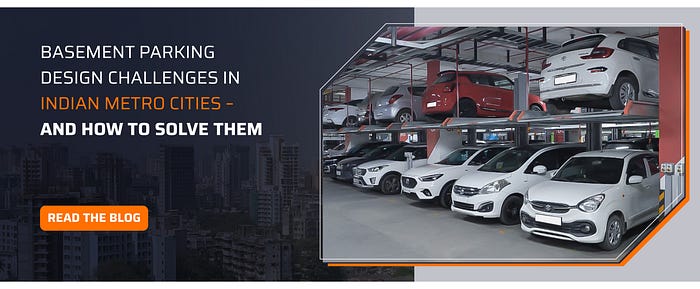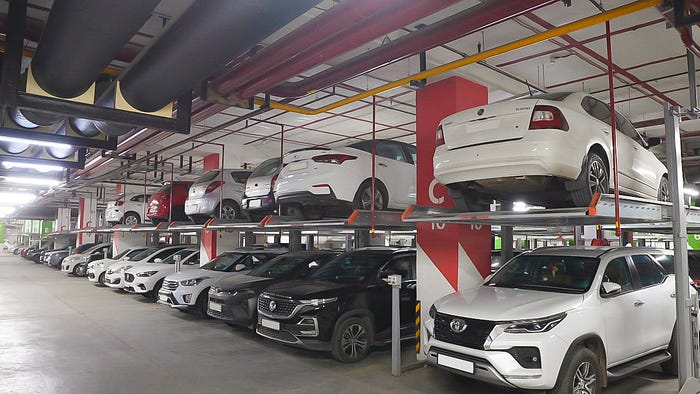
India is one of the fastest-developing countries that accommodates a population of 1.47 billion in a space that is rapidly shrinking, especially in metropolitan cities like Delhi and Mumbai. This shrinking space can be attributed to urbanization, growth in the number of cars owned, and parking spaces that don’t utilize new and upcoming technologies, instead focusing on only horizontal space utilization. This is where basement parking design comes in. Basement parking is an efficient option for multi-level car parking. Since it does not use the existing horizontal space, but makes its own space underground, it is suitable to tackle the rising urban space
shrinkage, especially with multi-level parking. Basement parking design, however, comes with its own set of design challenges that can hamper its efficiency. In this article, we are going to examine basement parking design challenges in Indian metro cities and how to solve them.
The Urban Reality: Why Basement Parking Matters
Basement parking is increasingly becoming the need of the hour for various reasons. Some of the most pertinent reasons include:
Rising Property Rates
As the urban land shrinks, the property rates keep increasing. In this situation, the usage of vertical parking starts to become a more viable and logical option for car parking.
Essential Use
Basement parking opens up a new space to park several cars. Since it can afford to park a higher number of cars, it has now become a part of most parkings in residential towers, malls,
hospitals, and offices.
Key Basement Parking Design Challenges (Core Section)
The design of the basement parking is posed by a number of challenges. These challenges include:
Limited Space & Poor Manoeuvrability
Most basement parking spaces are created with space restrictions. Now, these restrictions are overcome with architectural solutions that include the creation of narrow basements, tight ramps, and blind turns in the parking spaces. These solutions, however, create several problems, including traffic bottlenecks, risk of dents in cars, and inefficient circulation of the moving cars, especially on days when there is a high volume of cars.
The foremost method to deal with such problems is to have a smarter layout of the multi-level car parking system. There can be one-way circulation of the vehicles, turntables for cars, even puzzle and stack parking systems, and other mechanical and automated parking systems that can increase the car capacity without widening the space.
Safety, Visibility & Emergency Access
Another big challenge that comes with basement parking in metro cities is that of dark corners, poor lighting, and difficulty in efficient evacuation of the cars in cases of emergency. This poses fire safety and pedestrian safety challenges for all the cars inside the multi-level car parking system.
The solution for these problems is straightforward. In areas with poor lighting and dark corners, there needs to be high-lux lighting, CCTV cameras, sprinkler systems, routes that are designated for pedestrians, clear signage at every entry, exit, and turn, and elevators near the entries.
Another surmounting challenge is that of the rising number of cars. One basement parking space simply cannot keep up with the rising number of cars. So clearly, there needs to be an increase in the capacity of the vehicles that can park in these basement multi-level car parking systems.
Mechanical parking systems like stack parking and puzzle parking can help increase the car capacity without any need for digging multiple basements ever to arise.
The Role of Mechanical & Automated Parking Systems (100–120 words)
In basement parking design, stack, puzzle, and other multi-level parking systems can play a big role in streamlining the car parking and retrieval, and increasing the overall capacity of the space. These systems can help:
- Increase capacity in the same footprint
- Reduce emissions & time
- Improves car safety
- Fire-safety compliance
- EV-ready infrastructure
- Automated parking where space is limited

The Takeaway
This article has highlighted how basement parking challenges are very real, but they are also very solvable. When there is going to be better planning with a modern parking technology, metro cities can stay assured that their basement parking is going to be safer, cleaner, and are going to have more efficient parking and retrieval.
Why Choose KLAUS Multiparking?
KLAUS Multiparking is one of the leading multiparking companies in the country. We offer a varied range of automated, semi-automated, and mechanical parking systems that are customized to the needs of your business. Our puzzle, stack, and tower parking solutions have increased the parking capacity in traditional spaces. KLAUS Multiparking’s vision is to create a new smart parking future with automation, smart design, and space optimization.
No comments:
Post a Comment